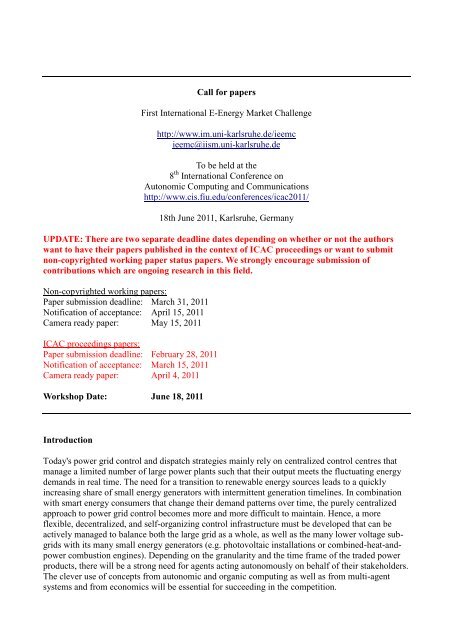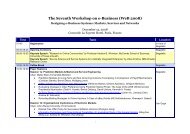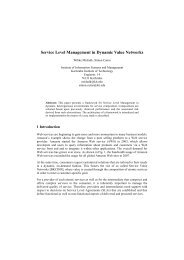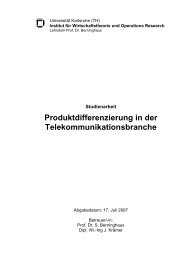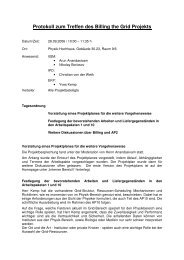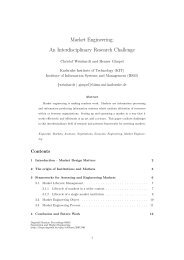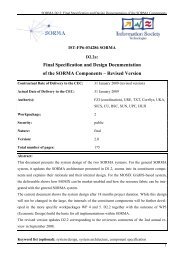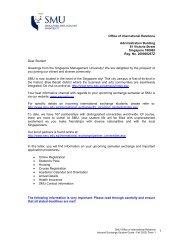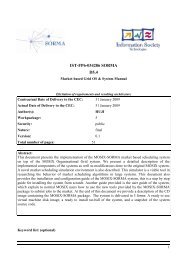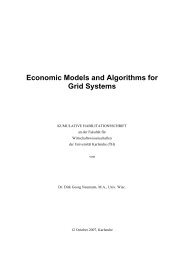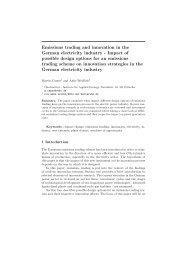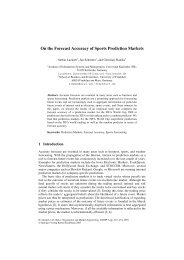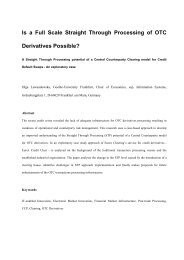IEEMC Call for Papers - IISM
IEEMC Call for Papers - IISM
IEEMC Call for Papers - IISM
Create successful ePaper yourself
Turn your PDF publications into a flip-book with our unique Google optimized e-Paper software.
<strong>Call</strong> <strong>for</strong> papers<br />
First International E-Energy Market Challenge<br />
http://www.im.uni-karlsruhe.de/ieemc<br />
ieemc@iism.uni-karlsruhe.de<br />
To be held at the<br />
8 th International Conference on<br />
Autonomic Computing and Communications<br />
http://www.cis.fiu.edu/conferences/icac2011/<br />
18th June 2011, Karlsruhe, Germany<br />
UPDATE: There are two separate deadline dates depending on whether or not the authors<br />
want to have their papers published in the context of ICAC proceedings or want to submit<br />
non-copyrighted working paper status papers. We strongly encourage submission of<br />
contributions which are ongoing research in this field.<br />
Non-copyrighted working papers:<br />
Paper submission deadline: March 31, 2011<br />
Notification of acceptance: April 15, 2011<br />
Camera ready paper: May 15, 2011<br />
ICAC proceedings papers:<br />
Paper submission deadline: February 28, 2011<br />
Notification of acceptance: March 15, 2011<br />
Camera ready paper: April 4, 2011<br />
Workshop Date: June 18, 2011<br />
Introduction<br />
Today's power grid control and dispatch strategies mainly rely on centralized control centres that<br />
manage a limited number of large power plants such that their output meets the fluctuating energy<br />
demands in real time. The need <strong>for</strong> a transition to renewable energy sources leads to a quickly<br />
increasing share of small energy generators with intermittent generation timelines. In combination<br />
with smart energy consumers that change their demand patterns over time, the purely centralized<br />
approach to power grid control becomes more and more difficult to maintain. Hence, a more<br />
flexible, decentralized, and self-organizing control infrastructure must be developed that can be<br />
actively managed to balance both the large grid as a whole, as well as the many lower voltage subgrids<br />
with its many small energy generators (e.g. photovoltaic installations or combined-heat-andpower<br />
combustion engines). Depending on the granularity and the time frame of the traded power<br />
products, there will be a strong need <strong>for</strong> agents acting autonomously on behalf of their stakeholders.<br />
The clever use of concepts from autonomic and organic computing as well as from multi-agent<br />
systems and from economics will be essential <strong>for</strong> succeeding in the competition.
One candidate <strong>for</strong> such a new control infrastructure is an energy market at the retail level, i.e. at the<br />
level of currently completely passive and unmanaged (low-voltage) distribution grids. To help<br />
mitigate the risk of instituting such markets in the real world, agent-based simulations of such<br />
markets can provide important insights. Workshop participants are thus invited to join in to a<br />
program of economic modelling and laboratory experimentation to understand and experiment with<br />
retail energy market design along with the per<strong>for</strong>mance of their own autonomous agents in a<br />
competitive simulation environment.<br />
Topics of interest<br />
The workshop focuses on the design, realization and evaluation simulations agents of the workshop<br />
participants. We are especially interested in novel decision-making algorithms, game-theoretic<br />
models and analyses, innovative technical agent as well as machine learning frameworks in the<br />
context of multi-agent settings within the energy domain.<br />
Retail level energy markets have a huge potential to meet the challenges which the structural<br />
change towards renewable, intermittent energy generators poses to electricity networks all over the<br />
world. At the same time such local markets are characterized by a multitude of different actors such<br />
as households, electric vehicle owners or commercial customers. Conventional optimization<br />
techniques such (e.g. dynamic programming) are hardly implementable within such diverse and<br />
complex systems. In contrast competitive market simulations thrive within such settings and thus<br />
offer a way to design and test retail energy markets prior to a real world implementation.<br />
We, moreover, want to present and discuss a competitive testbed environment <strong>for</strong> agent-based<br />
simulations along the lines of the well-established trading agent competitions. This trading agent<br />
competition <strong>for</strong> energy markets (Power TAC) is supposed to facilitate research and development of<br />
appropriate retail energy market structures along with corresponding software agents that can<br />
support or even automate decision making in these markets. This environment will model a marketbased<br />
management structure <strong>for</strong> local and regional energy networks at multiple levels of<br />
complexity. It will closely model reality by using real historic data on energy production and<br />
consumption, weather, and consumer preferences. A more detailed description of the competition is<br />
available online at powertac.org. We hope to run a live competition at the workshop.<br />
Submissions and further in<strong>for</strong>mation<br />
We are interested in both theoretical as well as implementation-oriented papers on agent-based<br />
simulation systems <strong>for</strong> energy markets. <strong>Papers</strong> should be around 10 pages including the text, figures<br />
and references.<br />
<strong>Papers</strong> must be <strong>for</strong>matted according to the ACM proceedings <strong>for</strong>mat and can be submitted via the<br />
EasyChair submission system:<br />
https://www.easychair.org/account/signin.cgi?conf=ieemc11<br />
Further instructions <strong>for</strong> submissions are available on the website.<br />
The workshop is co-located with the 8th IEEE/ACM International Conference on Autonomic<br />
Computing (ICAC). ICAC2011 will be held in Karlsruhe, Germany from the 14th-18th of June. The<br />
<strong>IEEMC</strong> workshop will be held on the 18 th of June.<br />
For any questions, send your email to: ieemc@iism.uni-karlsruhe.de
Organizing committee<br />
<br />
<br />
<br />
<br />
Christof Weinhardt, KIT<br />
Wolfgang Ketter, RSM<br />
Lilia Filipova-Neumann, FZI<br />
Anke Weidlich, SAP Research<br />
Program committee<br />
<br />
<br />
<br />
<br />
<br />
<br />
<br />
<br />
<br />
<br />
<br />
<br />
Carsten Block, Karlsruhe Institute of Technology<br />
John Collins, University of Minnesota<br />
Hellmuth Frey, EnBW<br />
Christoph Flath, FZI<br />
Steven Kimbrough, Wharton School of Business<br />
Marco Kuhrmann, Technical University of Munich<br />
Steffen Lamparter, Siemens<br />
Sebastian Lehnhoff, University of Oldenburg, OFFIS<br />
Detlev Schumann, IBM<br />
Orestis Terzidis, SAP Research<br />
Clemens van Dinther, Karlsruhe Institute of Technology<br />
Harald Vogt, SAP Research


